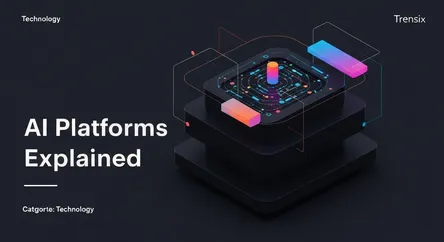Technology
AI Platforms Explained

Discover what AI platforms are, the frameworks they provide for building AI models, and why they are key to modern innovation and business.
What is it?
An AI platform is a comprehensive suite of tools and services that allows developers, data scientists, and businesses to build, train, deploy, and manage artificial intelligence models at scale. These platforms provide the underlying infrastructure, frameworks (like TensorFlow or PyTorch), and pre-built algorithms needed for machine learning, natural language processing, and computer vision tasks. Major examples include Google Cloud AI, Amazon SageMaker, and Microsoft Azure AI, which offer a streamlined workflow from data preparation to model deployment.
Why is it trending?
AI platforms are trending because they democratize access to powerful AI capabilities. Previously, building AI required deep expertise and massive computational resources. Today, these platforms lower the barrier to entry, enabling organizations of all sizes to leverage AI without building everything from scratch. This accelerates innovation and allows companies to integrate intelligent features into their products and services quickly. The explosion of big data and the competitive need for data-driven insights further fuel their adoption across all industries.
How does it affect people?
For the average person, the rise of AI platforms translates into more sophisticated and personalized experiences. They power the recommendation engines on streaming services, the virtual assistants in our homes, and advanced medical diagnostic tools. For professionals, these platforms create demand for new skills in data science and AI development while also empowering non-experts to utilize AI tools. They fundamentally change how businesses operate, leading to more efficient services, smarter products, and new solutions to complex global challenges.